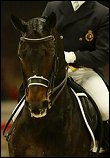|
Editorials
26th March 2006 - Trainer's Envy
 In his monumental poem "Song of Myself" (Leaves of Grass), American cult poet Walt Whitman wrote, "I am the teacher of athletes, he that by me spreads a wider breast than my own proves the width of my own, He most honors my style who learns under it to destroy the teacher." In his monumental poem "Song of Myself" (Leaves of Grass), American cult poet Walt Whitman wrote, "I am the teacher of athletes, he that by me spreads a wider breast than my own proves the width of my own, He most honors my style who learns under it to destroy the teacher."
To Whitman, the goal of teaching is making the student more skilled than the teacher, so that they can eclipse their master (which virtually means committing parricide). Unfortunately, this poetry is not in motion in the dressage world. When student Edward Gal beat Anky van Grunsven in the Grand Prix at the 2005 World Cup Finals in Las Vegas, Van Grunsven joked, "I train Edward for free, but I think I have to start charging him."
At the highest level of dressage, how many trainers actually compete against their students? Furthermore, is it a smart move to train students that are competing in your league? It makes one wonder to what extent actively competing trainers are integer in passing on their knowledge to their students. Don't they secretly hope their students to score just that tiny bit lower than themselves? Do they hold back in passing on knowledge, maybe unconsciously?
Being a good dressage trainer is a gift. Not only does a trainer need extensive knowledge of the art of dressage (gained through experience, observation, and maybe even reading), but he also needs to have talent and feeling for riding horses himself. Also, good communicative skills are definitely an asset for the trainer to pass on his message efficiently.
Dressage trainers are a special breed, and for fun's sake, Eurodressage has made a rough sketch of a few types of trainers that can be spotted on the sideline of a "school" at local, regional, national and international competitions.
a) the unqualified instructor. S/he can often be described as "the screamer". He yells total nonsense so loudly at his student that everyone in the warm up is getting a free lesson. Usually the result is total failure because the student is mentally not ready for the instructions he's being shouted, or the trainer doesn't know what he's talking about and thinks the lesson becomes more effective by turning up the volume. Trainers who often resort under category "A" are non-horsey parents who believe they are helping their children warming up, but in fact are 'winding them up'.
b) the non communicative rider. This is the trainer who is an outstanding rider himself, but just doesn't know how to verbalize and communicate his experience in the saddle to his students. Quite sad, but it happens.
c) the celebrity trainer. A trainer who has become famous through P.R. and is doing the whole shebang of clinics, symposiums and workshops. However, you wonder which student they actually trained to success and are surprised by the fact that you can't come up with one name.
d) the high maintenance trainer. S/he is usually a good trainer with a longstanding record of multiple winning students. He has the knowledge and communicative skills to teach riders to ride. The only problem with him is his arrogance. He is used to being treated like VIP and is not afraid to foul-mouth spectators, FEI stewards, or his own students as he considers himself "the authority" in the sport. He usually looks down upon strangers, is unfriendly because of lack of time (hurry hurry make more money), and lives in an ivory tower. He often has big bucks clients and is a tricky horse dealer in his leisure time. It is always a catch-22 with him. He has the knowledge to teach one to ride and the power to play the politics, but one feels uncomfortable because of his policies.
e) The Mary Poppins trainer. S/he is the ideal one. Patient, knowledgeable, verbally proficient, integer, loyal. He's a trainer that helps the rider ride at his level and is able to gradually move the rider up the scale while giving him the time to screw up and recover. He treats the student with the same respect as he likes to be treated.
Yes, s/he does exist.
--Astrid Appels
info@eurodressage.com
|
